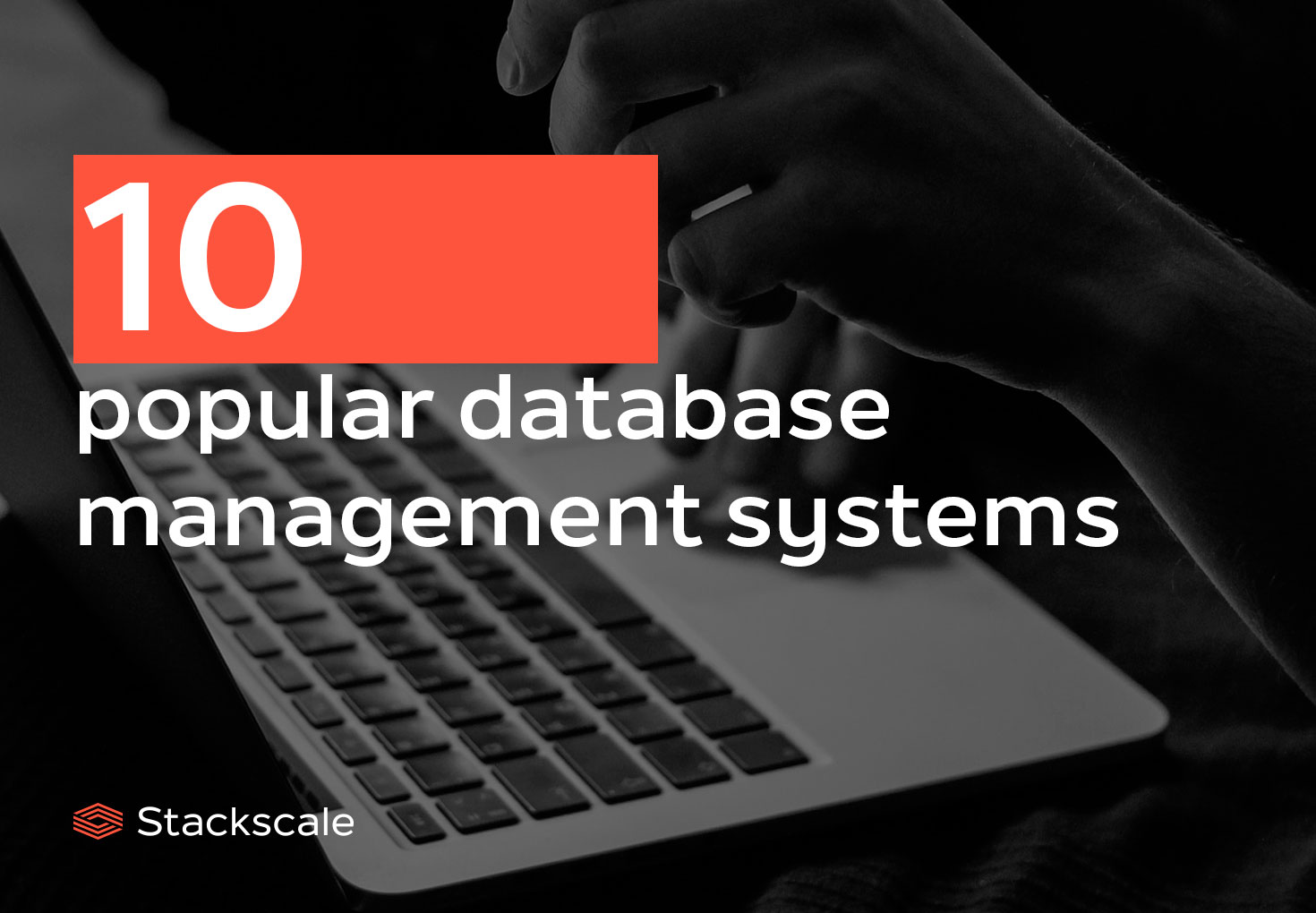We have collected some of the most popular database management systems (DBMS) nowadays. Let’s start by defining what a database management system is.
What is a database management system?
A database management system (DBMS) is a software used to define, manipulate, retrieve, store and manage data in databases.
To sum up, database management systems are in charge of:
- Defining rules to validate and manipulate data.
- Interacting with databases, applications and end users.
- Retrieving, storing and analyzing data.
- Updating data.
Popular database management systems
MySQL
MySQL is a free, open source relational database management system (RDBMS). It was initially owned by MySQL AB, before being acquired by Sun Microsystems (part of Oracle Corporation since 2010). MySQL was originally developed by Ulf Michael Widenius, Swedes David Axmark and Allan Larsson, founders of MySQL AB.
Many database-driven web applications, such as WordPress, Joomla and phpBB, as well as many popular websites like MediaWiki, Twitter and Facebook, use MySQL.
Developer: Oracle Corporation.
Original author: MySQL AB.
Latest MySQL release: MySQL 8.0.32.
MySQL license: GNU General Public License version 2 and proprietary.
MariaDB
MariaDB is a community-developed, free and open source relational database management system. It is a fork of MySQL. MariaDB was originally developed by Ulf Michael Widenius, Swedes David Axmark and Allan Larsson, founders of MySQL AB and the MariaDB Foundation. Ulf Michael Widenius is the current lead developer and CTO of MariaDB.
MariaDB is also included in numerous Linux distributions, such as CentOS, Debian and RHEL. Besides, it is used by many organizations such as Wikipedia, Google or Tumblr.
Developer: MariaDB Corporation Ab and MariaDB Foundation.
Latest MariaDB release: MariaDB 11.1.0.
MariaDB license: GPL version 2.
Microsoft SQL Server
Microsoft SQL Server is a commercial relational database management system. It is available in multiple editions, divided into three main categories: mainstream, specialized and discontinued editions.
Developer: Microsoft.
Latest Microsoft SQL Server release: Microsoft SQL Server 2022.
Microsoft SQL Server license: proprietary license.
Oracle DBMS
Oracle DBMS is a commercial, multi-model database management system. It is also known as Oracle Database or just Oracle. It is commonly used for running: online transaction processing (OLTP) and data warehousing (DW).
Developer: Oracle Corporation.
Latest Oracle DBMS long-term release: Oracle DBMS 19c.
Latest Oracle DBMS release: Oracle DBMS 23c beta.
Oracle DBMS license: proprietary license.
PostgreSQL
PostgreSQL is a free, open source relational database management system (RDBMS). It was initially developed as a successor of the Ingres database, developed at the University of California, Berkeley.
Developer: PostgreSQL Global Development Group.
Latest PostgreSQL release: PostgreSQL 15.2.
PostgreSQL license: PostgreSQL license.
MongoDB
MongoDB is an open source, NoSQL, document-oriented database management system. MongoDB Inc. offers an integrated suite of cloud database services, as well as commercial support. This document-oriented database software is commonly used for high-volume data storage.
Developer: MongoDB Inc.
Latest MongoDB release: MongoDB 6.0.4.
MongoDB license: Server Side Public License (SSPL).
Redis
Redis, short for “Remote Dictionary Server”, is an open source, NoSQL, key-value database management system.
Developer: Redis.
Original author: Salvatore Sanfilippo.
Latest Redis release: Redis 7.0.
Redis license: BSD 3-clause.
IBM DB2
IBM DB2 is a database management product developed by IBM, formerly known as DB2 for Linux, UNIX and Windows.
Developer: IBM.
Latest IBM DB2 release: IBM DB2 11.5.8.
IBM DB2 license: proprietary license.
Elasticsearch
Elasticsearch is a distributed, RESTful search and analytics engine. It is based on the Lucene library. Elasticsearch is the successor to a previous search engine called Compass, also designed by Shay Banon.
Developer: Elastic NV.
Original author: Shay Banon.
Latest Elasticsearch release: Elasticsearch 8.7.
Elasticsearch license: dual-licensed Elastic license and Server Side Public License.
SQLite
SQLite is a public domain database engine that belongs to the embedded, relational database management systems family. It has bindings to many programming languages.
Developer: Dwayne Richard Hipp.
Latest SQLite release: SQLite 3.41.2.
SQLite license: Public domain.
Comparing database management systems
| DBMS | Type | Operating systems | License | Written in |
| MySQL | RDBMS | Canonical, FreeBSD, Linux, MacOS, Solaris and Windows | GNU GPL v2 and proprietary | C and C++ |
| MariaDB | RDBMS | Linux, MacOS and Windows | GNU GPL v2 | Bash, C, C++, and Perl |
| Microsoft SQL Server | RDBMS | Linux and Windows | Proprietary | C and C++ |
| Oracle DBMS | Multi-model database management system | AIX, BS2000, HP-UX, Linux, MacOS and Windows | Proprietary | Assembly language, C and C++ |
| PostgreSQL | RDBMS | FreeBSD, Linux, MacOS, OpenBSD and Windows | PostgreSQL license | C |
| MongoDB | Document-oriented database | FreeBSD, Linux, MacOS and Windows | Server Side Public License | C++, JavaScript and Python |
| Redis | Key-value database | Unix-like | BSD 3-clause | C |
| IBM DB2 | RDBMS | Linux, Unix-like and Windows | Proprietary | Assembly, C, C++ and Java |
| Elasticsearch | Search and index | Linux, MacOS and Windows | Dual-licensed Elastic license and Server Side Public License | Java |
| SQLite | RDBMS | Android, BSD, iOS, Linux, MacOS, Solaris, VxWorks and Windows | Public domain | C |
Top 10 database management systems
Finally, according to DB-Engines ranking, as of April 2023*, these are the top 10 database management systems:
- Oracle
- MySQL
- Microsoft SQL Server
- PostgreSQL
- MongoDB
- Redis
- IBM DB2
- Elasticsearch
- SQLite
- Microsoft Access
*DB-Engines ranking is updated on a monthly basis.





